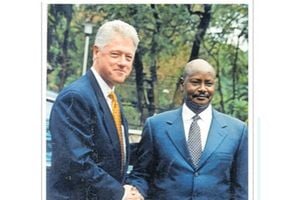
Philip Matogo
“The American Embassy in Kampala was closed on November 10, 1973, when all US diplomatic personnel were withdrawn from Uganda. The Department of State later cited as factors that prompted the closure persistent internal security problems, operating difficulties for American programmes and personnel, repeated public threats against embassy officials and other Americans by high Ugandan officials, and finally the abrupt expulsion of the US Marine Security Guard that protected the embassy.
Diplomatic relations were not interrupted and Uganda maintained an embassy in Washington. American interests in Uganda were represented by the Federal Republic of Germany,” reads a post on the website of the Office of the Historian of the United States Department of State within the Foreign Service Institute.
Again on November 10, but in 1871, according to his journal, explorer Henry Morton Stanley greeted David Livingstone, the fellow explorer in search of the source of the Nile River, with the immortal words “Dr Livingstone, I presume?”
Both dates, more than 100 years apart, represent preludes to near-cataclysmic events in our history. The closing of the American embassy was a foretaste of the chaos to come. While Stanley and Livingstone’s meeting served as a dress rehearsal, as it were, to how colonial rule would denude Uganda.
The country, as a result, would be a naked lie. It’s togetherness, a myth. It’s sense of self, pure fiction. And its independence: a broken reed cast adrift on neo-colonial seas.Most importantly, both dates reflect two stages of the same journey.
The arrival of Stanley and Livingston was the coming together of a colonial design to leave this region economically threadbare. The departure of the Americans was the coming apart (at the seams) of an imperial plot to wrest Uganda from Soviet and Islamic influence. This would return Uganda to the clutches of Western control.
As you can see, on each date, Uganda, or the lands later known as Uganda, was like a revolving door in which those who arrived did so for the same reason as those who departed. This left the country neither coming nor going; in a manner of speaking.
Since the object of the said arrival and departure was how best Uganda could be exploited, unsparingly. This exploitation was strictly for the economic betterment of two countries, England and the USA, whose interests converged where Uganda’s diverged.
Sets of interests
This civic dissonance between foreign and indigenous interests highlights how inconsistent or contradictory these two sets of interests are. In pursuit of peace, though, countries must reduce or nullify their inconsistencies by harmonising them.
This harmonisation is officially executed by supranational organisations to ensure that a degree of consistency implies a measure of restraint in how nations transact values. So peace is not only achieved in the absence of war but by a sovereign reciprocity preserved by its very consistency. Accordingly, we see that consistency is the lifeblood of any given country.
It is the consistency of interests that resolves the contradictions between nations and peoples. That is why we create institutions: to ensure the predictability born of consistency.
Correspondingly, we must know that there shall be an orderly sharing or transfer of power. And this knowledge must be consistent with the spirit of international and domestic comity.
So respect for human rights is not ritualised but routinised.
It becomes second nature. We then observe our civic duties and responsibilities as easily as we get up in the morning, bathe, dress up and do whatever it is that we do. Sadly, we still experience civic dissonance because we lack consistency in whom we are and where we seek to go.








